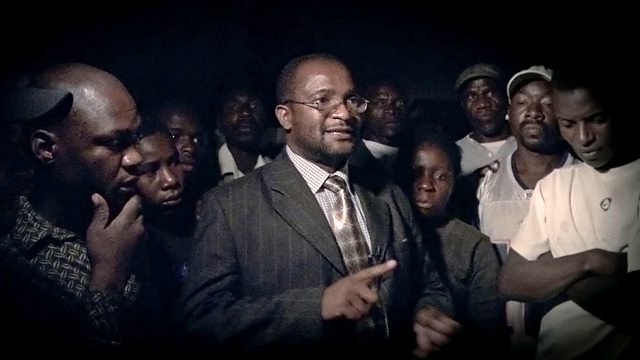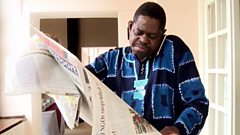
Mugabe and the Democrats
A Storyville documentary: two politicians from opposing parties join forces on an unlikely mission to lead Zimbabwe through the process of writing a new constitution.
Political documentary thriller set in Zimbabwe, following two political enemies forced on a joint mission.
Two top politicians, MP Paul Mangwana and MP Douglas Mwonzora, from the governing party and the opposition respectively, have been appointed to lead Zimbabwe through the process of writing a new constitution. It is the ultimate test that will either take the country a decisive step closer to democracy and away from President Robert Mugabe's dictatorship, or towards renewed repression.
The film follows the two adversaries as they undertake their gargantuan task, travelling together throughout the country to ask Zimbabweans about their opinions on matters including the judicial system and the president's authority. Overcoming their initial suspicion, a kind of understanding grows between the two men, as they endure intrigue during the negotiations that follow. In a country impeded by economic sanctions from the international community and hyperinflation, failure is not an option.
Last on
More episodes
Clip
-
![]()
Mangwana hits back at press reports
Duration: 01:16
Camilla Nielsson, director of Mugabe and the Democrats, answers the Storyville Q&A

Character is more important for me.
��
What made you first want to explore the subject?
It wasn’t so much the subject of a new constitution itself I wanted to explore, but more the idea of following two former political enemies forced together on a mission to introduce true democracy in Zimbabwe.
��
How long did it take to get the film off the ground?
Getting the official permits to film in Zimbabwe took more than one year. Financing the film took even longer. Pitching a film about a constitution-making process in Africa was a hard sell.
��
What were you most surprised to learn in the course of production?
How open the people of Zimbabwe were to our filmmaking. Being a white European filmmaker, we were often met with a lot of antagonism and closed doors. With good reason - another white colonial gaze trying to tell an African story. But after explaining what we were doing and how we were doing it, we were quickly accepted as part of the furniture.
What have been the differences in reception to the film in countries it has now travelled to?
Zimbabweans who have seen it have had a much stronger reaction to the film than non-Zimbabweans. There are so many layers in what is being said in the film, and even more so in what is not being said, and I think that although Democrats is a universal story, the strongest reactions yet have come from Zimbabweans.
Which documentary has most inspired you?
Albert Maysles’ Salesmen.
��
Favourite Website/blog?
Filmkommentaren.dk and Dlisted.com
��
Person you’d most like to interview (living or dead?)
Henry A. Kissinger
��
Best piece of filmmaking advice you’ve ever been given?
Trust your gut, and if in doubt then consult your stomach again.
Best piece of filmmaking equipment you can’t live without?
Coloured tape to mark my sound cables. Constantly switching cables between the boom, the camera mic and several micro ports on a hectic documentary shoot can be a real mess. So, until someone designs a small full HD camera with 4 audio channels, I would not want to film without it.
��
If money was no object, what is your dream documentary subject?
Then I would like to make a film about the Vietnam war as seen through the eyes of Walter Cronkite. Clearing the necessary archive for a film like that would cost a huge amount.
Favourite film of all time?
John Cassavetes - A Woman Under the Influence
��
Most difficult access?
Filming the negotiations on the chapter on presidential powers for Zimbabwe’s�� new constitution.
��
Best recent read?
Slavoj Zizek’s ‘Living in the End Times.’
Credits
| Role | Contributor |
|---|---|
| Director | Camilla Nielsson |
| Series Editor | Nick Fraser |
Broadcasts
- Mon 9 Feb 2015 22:00
- Mon 4 Dec 2017 23:30

